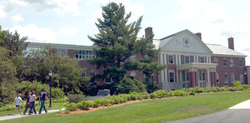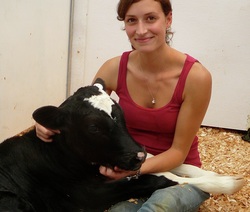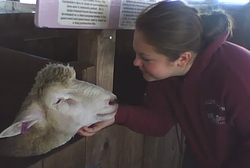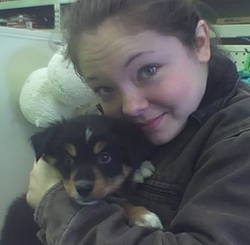The University of Maine

Photo from umaine.edu
Witter Farm is an integral part of the University of Maine, especially in the Animal & Veterinary Science (AVS) program. Students from other majors like Sustainable Agriculture and Biology benefit as well. Many classes and labs are held at the farm throughout the week and include activities like vaccinations, pregnancy checks, riding, training, and general care of the cattle and horses.
ABOUT UMAINE
The University of Maine, located in Orono, Maine, was established in 1865, known then as the Maine College of Agriculture and Mechanical Arts. Some of the first degree programs offered were agriculture and civil engineering. Today, it offers 88 bachelor's degree programs, 64 master's programs, and 25 doctoral degree programs. UM currently has over 11,000 students, including over 2,000 graduate students. The university is split into 5 "colleges": Engineering, Liberal Arts & Sciences, Natural Sciences, Forestry, and Agriculture; Business, Public Policy, and Health; and Education & Human Development. There is also a Explorations program for students who are not yet sure which major they would like to pursue.
To learn more about UMaine, visit the official website at http://www.umaine.edu
For more information about upcoming open house events and tours: http://www.go.umaine.edu/home/open-house-programs/
Check out UM's Animal and Veterinary Sciences Program:http://www.umaine.edu/animlvet/, the Sustainable Agriculture Program: http://www.sag.umaine.edu/, or the official J. F. Witter Teaching and Research Center website: http://umaine.edu/wittercenter/
For more information about applying to UMaine, visit http://www.go.umaine.edu/admissions-101/apply-to-umaine/
If you have questions about applying, e-mail the Office of Undergraduate Admissions at [email protected]
ABOUT UMAINE
The University of Maine, located in Orono, Maine, was established in 1865, known then as the Maine College of Agriculture and Mechanical Arts. Some of the first degree programs offered were agriculture and civil engineering. Today, it offers 88 bachelor's degree programs, 64 master's programs, and 25 doctoral degree programs. UM currently has over 11,000 students, including over 2,000 graduate students. The university is split into 5 "colleges": Engineering, Liberal Arts & Sciences, Natural Sciences, Forestry, and Agriculture; Business, Public Policy, and Health; and Education & Human Development. There is also a Explorations program for students who are not yet sure which major they would like to pursue.
To learn more about UMaine, visit the official website at http://www.umaine.edu
For more information about upcoming open house events and tours: http://www.go.umaine.edu/home/open-house-programs/
Check out UM's Animal and Veterinary Sciences Program:http://www.umaine.edu/animlvet/, the Sustainable Agriculture Program: http://www.sag.umaine.edu/, or the official J. F. Witter Teaching and Research Center website: http://umaine.edu/wittercenter/
For more information about applying to UMaine, visit http://www.go.umaine.edu/admissions-101/apply-to-umaine/
If you have questions about applying, e-mail the Office of Undergraduate Admissions at [email protected]
Interview with Caitlin Minutolo, AVS Student

Caitlin takes a break with calf, UM Sanchez Tina.
Tell us a little bit about yourself.
My name is Caitlin Minutolo, I grew up in Bar Harbor, ME and moved up to Orono when I was eight years old. I graduated from Orono High School in 2008 and began going to UNE as a psychobiologist since preveterinary wasn't a "real" major there. I transferred to UMaine my sophomore year and began to really pick away at what I wanted to become, a vet. I've been going to UMaine since and have really found a friendly home at the Witter farm by being around the staff, horses, and cows. I still have one year to go at UMaine and will hopefully be able to graduate on time...maybe if I'm really lucky I might still have a shot at getting into vet school.
What experiences have you had at Witter Farm?
My experiences at the farm are endless, I originally began working at the farm last year and continued through the summer. I am now taking the dairy cattle milking class AVS 347. The great part about farm is, once you've been around the animals enough...you get hooked. I'm taking techniques next semester and will hopefully be able to take the equine management course next year. In terms of specific experiences I have done everything from scrubbing milk pipelines to placing an IV. This summer really opened the door of opportunity by being around both the cows and horses. I mainly have had most of my experience with the cows but I plan to get more involved with the horses before I graduate.
What are some interesting things you have learned during your time at Witter?
Some interesting things I have learned at Witter are: how to properly milk a cow, how to assist in birthing calves, and how to treat a sick cow. I have also learned some very essential management factors on what cows require for a balanced diet, how you can get a cow or horse to like you, and how to give shots properly (without getting hurt).
Do you think Witter has helped you prepare for your future?
I think that if I didn't get involved at the Witter Farm than it would have not shaped me to be the person I am today. If it wasn't for Witter Farm I would have had to gain my experience somewhere else, most likely following around a vet, but the farm is the best place for a student to learn. The classes, employees, and animals really made my experience amazing and prepared me on what to expect if I decide to work with large animals.
Has being at Witter encouraged you to try new things or opened you up to new interests?
Being at the farm has really encouraged me in not being afraid of larger animals, just because they're bigger in size doesn't mean that you should be intimidated by them. I have also learned that, no matter where my future takes me, I will always have a love for the farm and will continue to come back. Witter is meant for students to push their comfort zone, most students wouldn't even dream of getting covered in manure or getting pushed around by horses or cows...but if we the "future vets" than we sure have to get comfortable with what we're doing in order to get the career we want.
What has been your most memorable experience at the farm?
One of the most memorable moments was being with the employees during the summer when we would get together for our monthly meetings. I have never laughed so hard from some of the stories that were shared. Another memorable experience that really made me feel like I wanted to become a vet was when I learned how be connected to the animals in both a medical and emotional way.
Who is your favorite animal at the farm?
It's a tie between four cows, one of which sadly died this summer...CoffeeKake because of her amazing singing skills, Lupine because of her hilarious personality, Rosemary because she's a big snuggle bug, and Tina because she's my calf that I named this summer.
Interview with Deanna Daigle, AVS Student

-Tell us a little bit about yourself.
I am from Ellsworth, Maine. My major has been Animal and Veterinary Sciences with a concentration in Pre-Veterinary Studies since my freshman year, I am now a senior. I just applied to University of Pennsylvania, Iowa State University, Kansas State University, and University of Wisconsin-Madison Veterinary Schools. I grew up with a collie named Jeremiah, he was put down the summer before I came to college. I adopted Gunner, a male German Shepherd-Husky mix from Penobscot Veterinary Services (Bangor, ME) when he was six months old in July '09. He was hit by a car and fractured his left hip. He had an FHO surgery where they removed the ball off his femur. His owners could not afford the surgery and surrendered him to the clinic where they did the surgery and neutered him and then put him up for adoption. I did about 750 hours of experience at PVS, mostly working with Dr. Simon Alexander at farms in Penobscot County and a few in Aroostook County. I did probably about 250 of those hours working in the clinic, mostly with Dr. Justina Kolvoord.
-What experiences have you had at Witter (classes, working, projects, etc.)?
AVS 145 Animal Science Lab. AVS 351 Animal Techniques. AVS 347 Dairy Cattle Technology (UMADCOWS) I tried to get a job freshman year, but I did not get work study and they couldn't afford to pay me outright when they could hire work study students. AVS 401 Senior Paper in Animal Science - I am doing a project on dehorning, seeing what effect it has on calves.
-What are some interesting things you have learned during your time at Witter?
How to trim a cow's foot. This is a specialty job that I never got to see with Dr. Alexander. I saw some horse hoof trimming, but only because the horses were lame...they usually had an abcess. It was also really interesting to be able to see how a farm is run on a daily basis.
-Do you think your time at Witter will benefit your resume/vet school apps/job apps/etc? Why?
Definitely. Students that are pre-vet at the University of Maine have a huge benefit because of the Witter Farm. Not only do we have the option of getting large animal experience, but it is a huge part of the curriculum, it is required for any student that wants thier Bachelor's degree in this program. This gives UMaine students more varied experience, which is something vet school admissions look for. Someone who has a lot of experience and is a "B" student is more likely to get in than a person with only a little experience, but has good grades. Most people that are applying to vet school these days are women, and most women want to play with kittens and puppies all day. People that are interested in or even have some large animal experience immediately have a better shot than other small animal applicants.
-Has being at Witter encouraged you to try new things or created a new interest for you?
Witter was my first school-related experience with large animals. I wanted to be a mixed-animal veterinarian since before I started my freshman year and had my first experience at Witter. But, working with the cows and horses at witter solidified my decision.
-What would you say to prospective students who are thinking about UMaine majors relating to the farm?
Especially for pre-vet students...get as much experience as you can, it is a great place to learn and have fun.
-What has been your most memorable (funny, moving, ridiculous, etc.) experience at the farm?
Well, it hasn't happened yet...but I have a feeling that seeing/heping my calf, now heifer, that I trained for the Orono Royal have her first calf will be an experience that i will never forget.
-What is your favorite part of being/working/having class at Witter?
I love cows :) I also get to reinforce what I learned riding with Dr. Simon Alexander.
-Who is your favorite animal?
Layla, now about to have her first baby, was my calf for the Orono Royal in AVS 351. She is now my cow in AVS 347, I will be there to help her calve. So she is obviously my favorite. However, my second favorite cow is one that I have worked with this semester in UMADCOWS, Lupine, coincidentally Layla's mother. That is not why I like her, she is just funny. She likes to wrap the tubes from the milking unit around her neck, she likes to steal your rags, chew on your shirt, etc. She also protects me when I go outside to watch heats, she head butts anyone that tries to come near me, she is awesome!
I am from Ellsworth, Maine. My major has been Animal and Veterinary Sciences with a concentration in Pre-Veterinary Studies since my freshman year, I am now a senior. I just applied to University of Pennsylvania, Iowa State University, Kansas State University, and University of Wisconsin-Madison Veterinary Schools. I grew up with a collie named Jeremiah, he was put down the summer before I came to college. I adopted Gunner, a male German Shepherd-Husky mix from Penobscot Veterinary Services (Bangor, ME) when he was six months old in July '09. He was hit by a car and fractured his left hip. He had an FHO surgery where they removed the ball off his femur. His owners could not afford the surgery and surrendered him to the clinic where they did the surgery and neutered him and then put him up for adoption. I did about 750 hours of experience at PVS, mostly working with Dr. Simon Alexander at farms in Penobscot County and a few in Aroostook County. I did probably about 250 of those hours working in the clinic, mostly with Dr. Justina Kolvoord.
-What experiences have you had at Witter (classes, working, projects, etc.)?
AVS 145 Animal Science Lab. AVS 351 Animal Techniques. AVS 347 Dairy Cattle Technology (UMADCOWS) I tried to get a job freshman year, but I did not get work study and they couldn't afford to pay me outright when they could hire work study students. AVS 401 Senior Paper in Animal Science - I am doing a project on dehorning, seeing what effect it has on calves.
-What are some interesting things you have learned during your time at Witter?
How to trim a cow's foot. This is a specialty job that I never got to see with Dr. Alexander. I saw some horse hoof trimming, but only because the horses were lame...they usually had an abcess. It was also really interesting to be able to see how a farm is run on a daily basis.
-Do you think your time at Witter will benefit your resume/vet school apps/job apps/etc? Why?
Definitely. Students that are pre-vet at the University of Maine have a huge benefit because of the Witter Farm. Not only do we have the option of getting large animal experience, but it is a huge part of the curriculum, it is required for any student that wants thier Bachelor's degree in this program. This gives UMaine students more varied experience, which is something vet school admissions look for. Someone who has a lot of experience and is a "B" student is more likely to get in than a person with only a little experience, but has good grades. Most people that are applying to vet school these days are women, and most women want to play with kittens and puppies all day. People that are interested in or even have some large animal experience immediately have a better shot than other small animal applicants.
-Has being at Witter encouraged you to try new things or created a new interest for you?
Witter was my first school-related experience with large animals. I wanted to be a mixed-animal veterinarian since before I started my freshman year and had my first experience at Witter. But, working with the cows and horses at witter solidified my decision.
-What would you say to prospective students who are thinking about UMaine majors relating to the farm?
Especially for pre-vet students...get as much experience as you can, it is a great place to learn and have fun.
-What has been your most memorable (funny, moving, ridiculous, etc.) experience at the farm?
Well, it hasn't happened yet...but I have a feeling that seeing/heping my calf, now heifer, that I trained for the Orono Royal have her first calf will be an experience that i will never forget.
-What is your favorite part of being/working/having class at Witter?
I love cows :) I also get to reinforce what I learned riding with Dr. Simon Alexander.
-Who is your favorite animal?
Layla, now about to have her first baby, was my calf for the Orono Royal in AVS 351. She is now my cow in AVS 347, I will be there to help her calve. So she is obviously my favorite. However, my second favorite cow is one that I have worked with this semester in UMADCOWS, Lupine, coincidentally Layla's mother. That is not why I like her, she is just funny. She likes to wrap the tubes from the milking unit around her neck, she likes to steal your rags, chew on your shirt, etc. She also protects me when I go outside to watch heats, she head butts anyone that tries to come near me, she is awesome!

